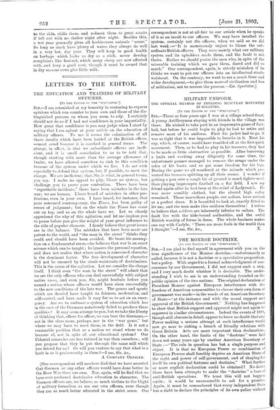LETTERS TO THE EDITOR.
THE EDUCATION AND TRAINING OF MILITARY OFFICERS.
(To THE EDITOR OF TIIR "SPECTATOR."] am astonished at my temerity in venturing to express opinions which run counter to your own and those of the dis- tinguished persons on whom you seem to rely. I certainly should not do so if I had not confidence in your impartiality. How great that confidence is you may judge when I start by saying that I am aghast at your article on the education of military officers. To me it seems the culmination of all those insults which have been hurled at the British officer, —most cruel because it is couched in general terms. The charge, in effect, is that we subordinate officer:3 are ineffi- cient, and it is small consolation to us to be told thah though starting with more than the average allowance of brains, we have allowed ourselves to sink to this condition because of the system under which we live. I do not wish especially to defend that system, but, if possible, to meet the charge. We are inefficient; that, Sir, is what, in general terms, you say. I make no appeal to pity. blame no system, but challenge you to prove your contention. There have been "regrettable incidents," there have been mistakes in the late war; we are human. I have heard of mistakes in other pro- fessions, even in your own. I have heard, for instance, that your esteemed contemporary, the Times, has been guilty of errors of judgment; but on the whole the Times has come out on top, and so on the whole have we. Let us clearly apprehend the why of this agitation, and let me implore you to pause before you give the weight of your great influence to the side of popular clamour. I firmly believe that great issues are in the balance. The mistakes that have been made are patent to the world, and "the man in the street" thinks they could and should have been avoided. He bases his assump- tion on a fundamental error,—he believes that war is an exact science which can be taught ; he ignores the personal equation, and does not realise that where action is concerned character is the dominant factor. The free development of character will not be ensured by the strait-waistcoats of doctrinaires. This is the cause of the agitation. Let me consider the charge itself. I think even "the man in the street" will admit that we are the only officers who can deal successfully with subject native races, and even you, Sir, might hesitate before you named a nation whose officers would have risen successfully to the new conditions of the late war. The games and sports which are decried have taught us fairness, moderation, and self-control, and have made it easy for us to act on an emer- gency. Are we to embrace a system of education which has in the case of the Germans notoriously failed to produce these qualities ? It may seem strange to you, but we take the liberty of thinking that, officer for officer, we can beat the Germans,— not in the class-room, perhaps, nor in the "war game," but where we may have to meet them, in the field. Is it not a reasonable position that as a nation we stand where we do because of, not in spite of, our educational system ? Our Colonial comrades are less tutored in war than ourselves ; will you propose that they be put through the same mill which you intend for us ? Or will you venture to say that what is a fault in us is praiseworthy in them P—I am, Sir, &c.,
A COMPANY OFFICER.
[Our correspondent will nowhere find that we have asserted that German or any other officers would have done better in the Boer War than our own. Nor, again, will he find that we have ever preferred doctrinaire education to character. The German officers are, we believe, as much victims to the blight of military formalism as are our own officers, even though they are so much better educated in the strict sense. Our
correspondent is not at all fair to our article when he speaks of it as an insult to our officers. We may have insulted the system, certainly not the officers, when we said as we did last week :—"It is monstrously unjust to blame the sub- ordinate British officers. They were merely what our military system and its upholders made them, and the fault is not theirs. Rather we should praise the men who, in spite of the miserable training which we gave them, dared and did so much." Our correspondent, again, is utterly mistaken if he thinks we want to put our officers into an intellectual strait- waistcoat. On the contrary, we want to see a much freer and wider development, —to give them more of civilianism and less of militarism, not to reverse the process.—En. Spectator.]






































 Previous page
Previous page